Improving production, reducing its costs and increasing the source of income for breeders were among the most important objectives of the field school project in Homs, which was recently completed in cooperation between FAO and the Ministry of Agriculture and Agrarian Reform represented by the Directorate of Livestock Development in Homs.
On the importance of this experience and its achieved results, Dr. Emile Salloum, Director of the Livestock Development Project, said, “The project that lasted 4 months included the establishment of 40 field schools spread across 29 villages in Homs governorate. Breeders in the targeted schools and through 20 weekly sessions have been able to learn about modern scientific methods and hygiene conditions for cows’ care, starting from providing a clean and healthy place, manufacturing fodder mixes with the aim of finding cheap and useful fodder alternatives for cows, reducing production costs and manufacturing high-quality food products, as well as helping to market this production”.
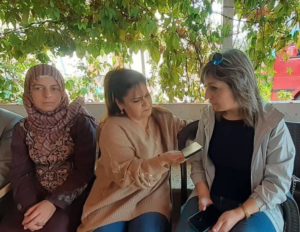
Dr. Salloum went on to say, “Field schools have ended as a timing, but they haven’t ended as work meetings and outreach. There is continuous follow-up with breeders via field tours, communications, networking groups and providing sustainable assistance. ”
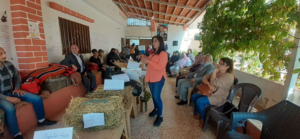
As for the results of this new experience, he says, “This experience has had a positive effect not only on the breeder, but on his family, neighbors and friends. These 18 beneficiaries spread the culture of field schools in the village and encouraged the rest of the villagers to attend these sessions and benefit from the information provided by specialists. ”
“For me the breeder is the only indicator of the success of this project. When he says that I have made use of this experience, then I will be certain that the project has achieved its hoped-for goals.” Salloum concluded.
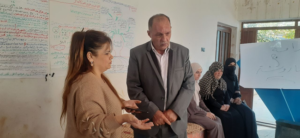
Eng. Dima Muhammad Al-Sakah, a facilitator of two schools in Homs, Al-Dweir School and Al-Ismailia School says, “The experience of the field schools was very successful. For 4 months, we tried to introduce modern breeding methods in simple ways for the breeders with the aim of promoting livestock. We started by teaching them ways to improve barns in terms of good ventilation, repairing walls and floors using lime, for its benefit in hygiene and sterilization. It is also necessary to provide a watering place next to the rack so that the cow can drink when it wants, and to provide windows with nets to prevent the entry of flies and insects that cause diseases to cows.”
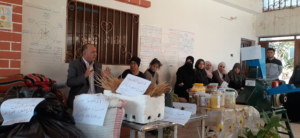
“At a later stage, we taught them how to make a healthy fodder mixture, so that every breeder is able to make the mixture and add vitamins and mineral salts to it. They also learned to take advantage of seasonal plants such as alfalfa to be used as fodder throughout the year after drying it, as well as fermenting corn cobs after grinding them with the school’s chopper. This significantly reduces production costs and improves product quality enabling them to manufacture foodstuffs such as cheese, butter and milk in larger quantities,” she added.
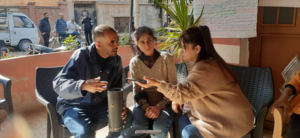
“One of the encouraging aspects is the noticeable decrease in cases of mastitis, for with the help of the California liquid that we supplied to him, can conduct a test to see if there is an inflammatory condition for the cow’s udder. If there is, the treatment is by using an inexpensive ointment, and the problem ends without the need to call a vet”, Al-Sakah concluded.
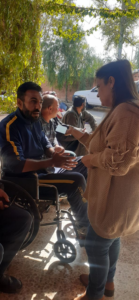
Marzieh Kara Khaled, from the village of Al-Dweir, said, ” my experience at the field school was very pleasant and successful. I continued to attend the 20 sessions and benefited from all the information provided to us by the trainers and specialists, especially with regard to the analysis of the agricultural ecosystem. All the instructions were applied, which reflected on the improvement of my cow’s health and the increase of its production, so I started making different products such as milk, cheese of all kinds, qurayshi, Shanklish, ghee and I sell my products, which have provided my family with a decent livelihood.”
Samar, widow and mother of three kids says, “Before the field school experience, my cow’s milk was so little that it was only enough to make some products for daily consumption for me and my kids, but with the weekly sessions with facilitators, my information has evolved in terms of cow care and how to prepare the intensive fodder mixture, which has contributed to the increase of high-quality milk, which is enough for me to make more of food products and sell them.
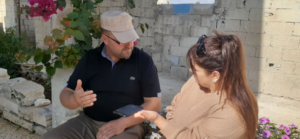
Breeder Abu Jassem says, “although I am not one of the 18 targeted breeders, I attended all the scheduled sessions and benefited greatly from the scientific information provided to us by the trainers. Thanks to this school, we make our own products and take care of cows, adopting scientific methods. We also learned how to take advantage of the neglected agricultural and animal waste so that we have zero waste, a clean environment and healthy feed at a cheap price.”
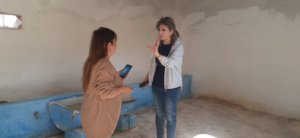
Suleiman Al-Mohammed and Mandaleen Al-Ahmad from Al-Ismailia School said, “We used to raise cows in traditional ways in villages without full scientific knowledge of how to take care of the cleanliness and health of the cow. We also used to buy expensive fodder during winter, but after our experience at the field school we changed many of the methods we had previously used and adopted the right scientific methods to care for the cow so we were able to increase our income especially when we managed to make balanced fodder mixtures from seasonal plants, after drying and storing them in suitable places until they are used “.
Munir Ibrahim confirmed that he has gained knowledge and experience in this school such as manufacturing feed mixes, harmful behaviour to the health of cows and the mechanisms that help reduce costs, lessen waste and improve production.
Meanwhile, Mukhtar al-Dweir, Mr. George Scrooge, confirmed that thanks to this project, breeders learned that there is nothing to throw away, and everything we have can be used and benefited from.
Ayman Taljeh, one of the beneficiaries, says “thanks to this project, I was able to build a model barn based on scientific and health methods, following all the instructions and advice given to me by specialists and trainers, so the cow’s health condition improved and milk production increased significantly.
Taljeh stressed that since the beginning of this project, the veterinarian has never been called, considering the construction of the Dairy and Cheese Manufacturing Unit in the village as one of the achievements of the field school.
Interviewed by Amal Farhat
Photos by A. Farhat

